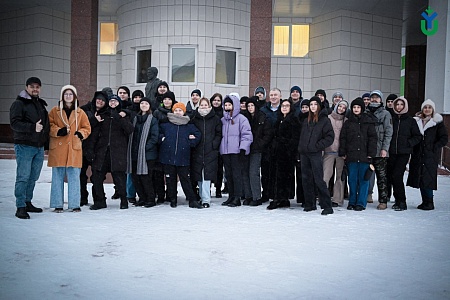YuSU students went to Anapa to help eliminate the consequences of an environmental disaster - an oil product spill. The volunteers were briefed in advance and provided with all the necessary equipment.
As Roman Kuchin, Rector of the University, noted, the interest in volunteer activities among YuSU students is extremely high: "Literally in half a day we managed to gather such a large group of volunteers. It is not surprising, because our university has an active volunteer center, and participation in such events has become an important part of student life. We see how many people around us are caring, ready to help in any difficult situation".
Accompanying the student volunteers are Anastasia Machinist, director of the Center for Support of Student Communities and Initiatives, and Alexander Zaikin, associate professor at the Higher School of Ecology. They not only help organize the work, but also inspire students to take active actions.
"Joining this mission was caused by the desire to help in the trouble that happened on the Black Sea coast. As we all know, our resort region is extremely small, and a disaster of this magnitude would certainly disrupt the summer vacation plans of thousands of Russians. For me, as an ecologist, the information about the large number of affected inhabitants of the Black Sea, birds and animals is especially alarming. Watching on the news how volunteers from different regions help to clean up the coast, I wanted very much to be among them. And, as you know, thoughts are material: the region's leadership received information about the possibility of sending volunteers to help Anapa, and in a very short period of time YuSU decided to assist in this. It was very pleasant to see how quickly the students responded and enrolled in the volunteer squads", - said Alexander Zaikin.
According to the associate professor, the rapid response of students to the call for help confirms the high civic responsibility of young people. In the ranks of volunteers there were students of different areas of training: “Ecology and Nature Management”, “Tourism”, “Journalism”, ‘Law’, “Physical Education and Sports”, “Electrical Power Engineering” and “Philology”. This shows the unity of values among the students and their desire to preserve the beauty of nature.
"Of course, everything that is happening now in the form of assistance requires special coordination of the process, and the volunteers of the Humanitarian Corps have been involved in solving these issues since the first days. A great appreciation to these people who organize the transfer of volunteers, their accommodation on the ground, meals and promptly solve arising issues. Undoubtedly, the business trip has a great practical aspect for me: I will be able to expand my personal experience, which I will then be able to pass on to students. As the head of the regional branch of the All-Russian Ecological Movement, I will be able to attract more attention from young people to the problem of preserving the nature of our country. As a member of the Khanty-Mansiysk branch of the Russian Geographical Society, I will be able to erase spatial barriers between the regions of our country in the face of the looming threat. And the most important thing is to say to yourself: you did it, you are there where your help is needed, and you are not alone, your like-minded people are with you!", - Alexander Zaikin added.
Yana Egorova, one of the ecology students, shared her thoughts about the upcoming mission: "For me, as an ecologist, this trip has a special meaning. I want to personally feel what it means to work in an emergency situation. In addition, I am pleased to realize that I can contribute to the solution of such a serious problem.
Also we remind that at the university military training centre a collection point of humanitarian aid for the headquarters #МЫВМЕСТЕ Krasnodar region is organized.
First of all the following items are needed:
construction bags,
shovels,
boots,
raincoats,
rubberized gloves,
safety glasses,
respirators FFP2/FFP3 or with A1P1 filters,
disposable painting suits.
In addition, volunteers need non-perishable food items to feed at the heating points: bars, cookies, chocolate, marshmallows, rolls, muffins, nuts, dried fruit, tea, sugar and coffee.
Humanitarian aid can be brought up to and including February 5 to military training centre, 3/233.
We are proud that our university has such responsive and caring students!
